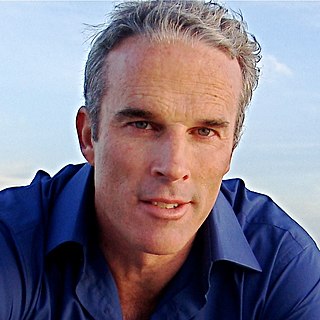A Quote by David Katz
The metaphor I routinely use is polar bears in the Sahara desert. You take creatures adapted to the cold and put them in the heat, the very traits that allow them to survive in one environment will conspire against them in the other. We are polar bears in the Sahara with one important distinction: we are smarter than the average bear. Once we identify the nature of the problem, we can think our way out of it. But it begins by acknowledging you didn't fail because you couldn't succeed. Because you didn't even know what the scope of the problem was. It's not your fault.
Quote Topics
Acknowledging
Adapted
Against
Allow
Average
Bear
Bears
Because
Begins
Cold
Creatures
Desert
Distinction
Environment
Even
Fail
Fault
Heat
Identify
Important
Know
Metaphor
Nature
Once
Other
Our
Out
Polar
Polar Bears
Problem
Put
Sahara
Sahara Desert
Scope
Smarter
Succeed
Survive
Take
Than
Them
Think
To Survive
Traits
Use
Very
Way
Will
Your
Related Quotes
It's Earth Day today. Let me tell you something about polar bears. They're endangered but you have to be careful because a polar bear is one of the few animals that will stalk a human. If you go to where polar bears live, it might stalk you and when you're on the plane going home, it might be behind you reading.
Polar bears did very well in the warmer times. They didn't die out at all; they didn't die out in the last 10,000 years, nor during the previous interglacial, nor the one before that. So, they're just used as a deceitful heartthrob; you know, to pluck your heartstrings because the polar bears might die out.
Another way to test hypotheses about adaptation is to consider trait variation across a group of species instead of focusing on the trait of a single species. Rather than seeking to explain why polar bears have fur of a certain thickness, one tries to explain why bears in colder climates have thicker fur than bears in warmer climates. The former problem is hard to solve, since it is hard to say exactly what fur thickness polar bears should have if natural selection guided the evolution of that trait.
Listing the polar bear under the Endangered Species Act could harm bear conservation efforts by eliminating revenues from the carefully-regulated sport hunting of polar bears by Americans and the importation of polar bear meat and trophies into the U.S. As hunting by non-Americans would replace hunting by Americans, nothing would be accomplished in terms of reducing the number of polar bears killed, but the revenue currently generated by American sport hunters for conservation and research efforts would be eliminated.
For humans, the Arctic is a harshly inhospitable place, but the conditions there are precisely what polar bears require to survive - and thrive. 'Harsh' to us is 'home' for them. Take away the ice and snow, increase the temperature by even a little, and the realm that makes their lives possible literally melts away.
Last night, we did the Threatdown -- God, it's hard to even talk about this -- and for the first time, I didn't mention bears. It's winter, they're asleep, I didn't think it would be a problem. But today I see this in the Toronto Globe and Mail -- apparently a 700-pound polar bear showed up at a children's hockey game. I've said this before, they're after our kids -- they're tender, juicy, you don't even have to throw away the bones.
My problem with my parents growing up was not that I was afraid to cry in front of them - they always wanted me to cry because they wanted me to be okay, but it felt kind of icky and gross to cry in front of my parents. So my problem was the polar opposite - I didn't want to cry in front of them because I didn't want to give them the satisfaction.
































